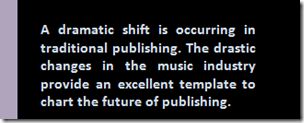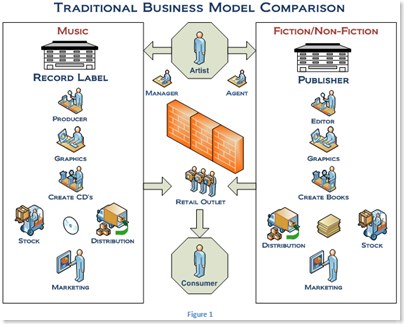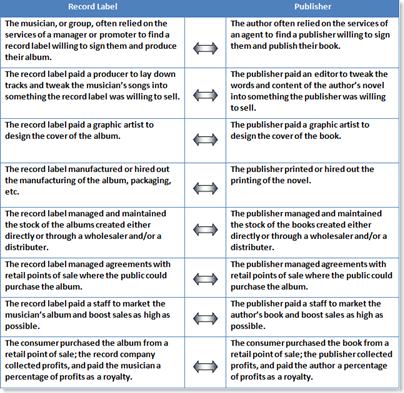Is the future of traditional publishing changing?
It’s 2008, and as a new author with an existing contract to have my first published novel, Three of a Kind, I entered the back end portion of being an author in today’s market. Presented with the arduous chore of self-promotion, I began to build a marketing plan, examined what is involved in distribution, and came to a shocking discovery; the future of the traditional publishing model was about to enter a fundamental change. 
Anyone involved in publishing or writing probably knows that in the last decade, at the very least, the industry has changed, as all things do. Publishing houses have grown lean and mean, more books than ever are being published, more people than ever are writing books, and it has become more difficult for the aspiring writer to get published and make any significant money doing so. Technology such as word processing software, personal computers, advances in printing, etc. drove much of that change. These technological advances opened the floodgates for people to take a plunge into writing, no longer afraid of a typewriter, whiteout, and poor spelling. More printed books meant more competition, a greater chance of failure, and a tightening on the drawstrings of a publisher’s budget. Gone are the days of huge advances and a small pool of author’s for consumers and publishers to draw from. The mega-publisher is next to impossible to access without an agent, and a good agent is next to impossible to attract since they receive hundreds of new manuscripts weekly. I recently read an interview with a well-known, respected author, with over fifty novels to his credit state that were he starting out today, he doubts an agent or publisher would even notice him. These changes have led to the proliferation of boutique publishers and self-publishing. The status quo however, remains stable and despite all these changes, the traditional model of publishing has remained intact. With the rare exception, if you want to get rich and famous off your writing, you need the representation of the mega-publisher.
That is all about to change, and in fact has already begun. As you will see, in the near future, that traditional model is going to turn upside down and inside out. A struggle is emerging that is going to give the individual author more power than ever before, although I must point out, talent is still required.
The drastic changes in the music industry provide an excellent template to chart the future of traditional publishing. Without a doubt, I’m not the first one to notice the similarities between the recording and publishing industries. Search the Internet and others are talking about this paradigm shift. There are as many opinions as there are posts about the future of publishing, some well thought out and some not. One thing they all agree on is that the traditional model is changing, and changing fast.
Before the occurrences in my life that led to me trying my hand at writing, I spent twenty-two years in the IT industry. Unhappy with the service of my publisher, a small, independent one, I realized that the future of my career depended on the future of publishing. As an IT architect, often called on to examine how a company’s business model could embrace or be migrated to the Internet, I turned that same eye toward publishing since I now had a vested interest.
What I learned completely changed my approach to publishing. Now, the terms POD (Print-on demand) and self-published didn’t sound as dirty or discouraging. Being just a talented author won’t be sufficient for success. The material in this article details where I see the future of publishing headed, and how to take advantage of it.
How do the traditional business models of recording and publishing compare?
For decades, the traditional business models of producing music and publishing books looked almost identical (see Figure 1). The artist, or author, was blocked off to the consumer requiring the service or business model of their respective industry to sell their work to the public. The differences between the recording industry and publishing industry were small, the similarities significant.
The following table details the overall similarities with the traditional record label’s business model and publisher’s business model. There is very little difference to both these models. This model has almost completely broken down and changed for the recording industry. The same causes for this drastic change are happening to the publishing industry. What were the events that led to the demise of the traditional recording industry business model?
Next Installment, I'll look at:
What happened to the traditional business model of the recording industry?




No comments:
Post a Comment